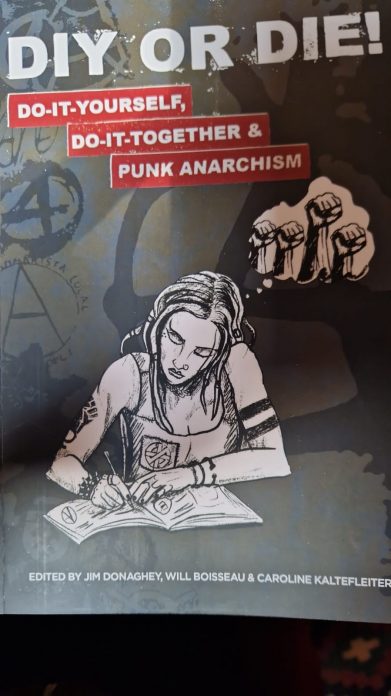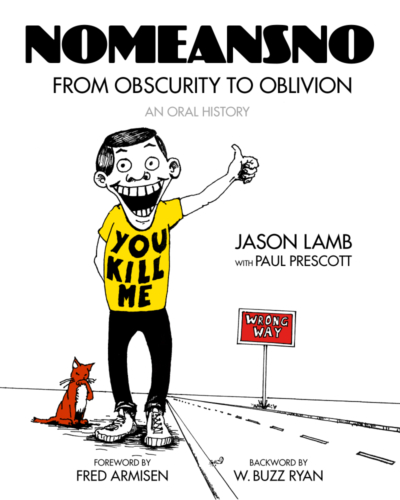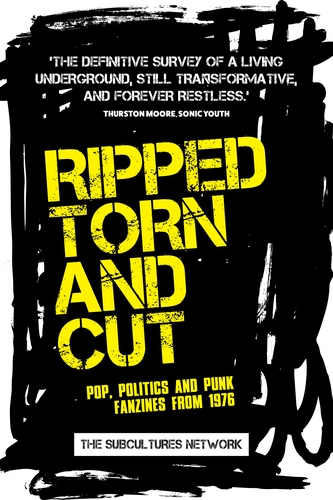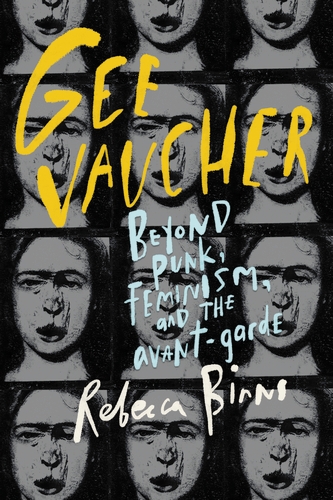Dezerter Miscarried Generation
£10.00
Dezerter “The” Polish punk band tell their own story, well Krzystof the drummer does!
Description
It is a colorful story about people who were creating outside the normal, commercial realm and of the orogins and development of Poland’s independent music scene.
The book’s author, Krzysztof Grabowski, co-founder and drummer for the band Dezerter (as well as songwriter), says:
“It’s not a sensational book. It’s not a drama. It’s not a history book and yet, I have tried to tell Poland’s most recent history from my perspective.
This book is not a band biography, just as it’s not my own biography. Even though I have tried, I’m not a true biographer. It’s not a diary full of gossip with rock and roll-like tales of sex – that’s not my thing. I’ve left the gossip to the tabloid hacks…”
Krzysztof Grabowski’s Dezerter – Miscarried Generation? is filled with photographs and archive band materials. The book’s style that the author designed and put together is meant to resemble the aesthetic of a band fanzine.
SOMETHING OF AN INTRODUCTION ALTHOUGH I DISLIKE THAT WORD…
IThe end of the 1970s, the late Gierek period [Translator’s Note – Edward Gierek was a First Secretary of the Polish United Workers’ Party from 1970 until 1980], was a time when Polish rock music practically did not exist. After the boom of the 1960s and later the development in rock music of “big beat” bands, a dry spell came. Perhaps musicians who played rock back then would be outraged to read this but unfortunately that is how it looked from the point of view of my generation – people who were merely teens at the time (but one has to admit that there were some progressive freak out bands, mainly SBB comes to my mind). Employees of the Polish People’s Republic media, who were obviously under constant censorship, allowed the audiences to develop some idea of what was going on in foreign music, yet they preferred to promote domestic performers, who offered safe, watered-down productions or who sang about nothing in particular. Rock music was played only on a few select radio programs. Meanwhile, in the West the amount of fantastic rock was staggering.In Poland the crew of comrade Gierek offered entertainment which fit with their idea of what the working class required. Festivals of military songs, soviet songs and the like were having a heyday, since they were an important tool of the propaganda machine. The “stars” of the stage at the time had to make a living, so they participated willingly. Colorful feathers and sequins dominated their costumes. Their one hundred percent submissiveness to communists guaranteed the performers a relatively safe life.Records were made by musicians who were accepted by the “culture officials”. Concert playing was made difficult not only by the requirement to obtain a ministry permit to perform. Private clubs did not exist, since private property was stigmatized, and the student clubs played a role as a reservoir of talents for the PZPR [TN – Polish United Workers’ Party]. This is a simplification but the general picture was more or less like that.When in 1976 ration cards were issued for sugar in Poland, this was a spectacular sign that the country was not well – although with hindsight it can be claimed this was a positive sign. The society suddenly realized that the people’s rule, supposedly so keen on taking care of the people, had started to crumble.
IIAt the time, my generation was finishing elementary school. The first realization that this “fantastic” system was not working properly came when, during vacation, I had to stand in gigantic lines with my mom to buy that wretched sugar which was needed for home preserves. Shops were scarcely filled and everyone had to aid themselves with a home production.Ever since I can remember, people complained about communism. They complained, but that was all. Father would listen to Radio Free Europe, then he would go to work and pretend to be content. There was fear in general. Since the communists showed that they could kill people for their convictions, no one tried to convince them. Everyone remembered the 1950s or, like us, had heard about them when the grown-ups talked. The year 1970 and the workers’ massacre in the Tricity was fresh in memory.I, as a youngster, could have felt that things were going poorly, but I still lacked any awareness. Television and radio tried to raise a generation that obeyed the will of the PZPR and was ready to labor in sweat to build a socialist fatherland. Fortunately, it did not work.
IIIIn the mid-1970s, the punk rock music rebellion took hold of the Western world. Young people had had enough of form over content in music and offered a vision of their own. Simple edgy songs, often with social/political context, caused a revolution in the music world. Anyone could pick up a guitar or a microphone and make his opinion known on any subject with no restraint. That was a shock for the Western culture. Sex Pistols, the Clash, and the Damned in Great Britain, Ramones and Dead Kennedys in the U.S. made way for a whole new number of bands.In Poland records with Western music were hard to come by, so the whole phenomenon was known only to a small number of people who showed real interest. As much as the Western youth rebellion was against rigid capitalism, the rebellion in Poland had a much more hardcore base, the anti-communist one. Punk was naturally leftist, but in the PRL [TN – Polish People’s Republic] such leftism was considered revolutionary. Everything was upside down here, so punk rock was a bit different too. There was no longing for socialism, since its clinical version was experienced by us at every step. One common point was that the system was the main enemy. In the West it was capitalism, here it was socialism.
Bands started to form. One after the other. All over Poland, all the way from Gdańsk to Ustrzyki Dolne. This was a first such spontaneous rising of the whole generation, stemmed from the opposition to what was offered by the PZPR ideological experts.
IVIt is often the case that the decisions made in youth influence our whole life. All is well when they are right. Was our decision to start the Dezerter band right? Oh yes… but to keep it going through the later years, too? I am not so sure of that. But it’s not like I regret anything. Matters of the band dominated my whole life, and set me up as an observer and a commentator of the reality. Would I have achieved more if I hadn’t been in a band? I can’t say. One thing is sure – I regret nothing.
VWhen I was a youngster, my brother, who was three years older than me, passionately listened to glam rock. It was difficult to get new recordings back then, so the ones you already had were listened to over and over again. First on a cassette tape, later on a reel-to-reel tape recorder. Among his favorite bands were stars like Suzi Quatro, Gary Glitter, Sweet, The Mud, The Rubettes, and Bay City Rollers. I had an earful of all that. I did not suffer too much because the music was good. After that, I started exploring the music world on my own. The Beatles were good for a start. I remembered hearing them on the radio in my childhood, and I got to know all of their records ten years after they disbanded. Then there were the Rolling Stones, Pink Floyd, the Doors, and Genesis. Hard rock was the next step. Black Sabbath, Deep Purple, Led Zeppelin, Uriah Heep, and Budgie.To get records, I would go with my buddy to an exchange that took place at the end of the week by Wolumen, a street in Warsaw. It was a market of antiques, records and various other things. Under the communists, Western records were a sought-after and hard to get commodity. Traders from all over the country came to the Wolumen market.One summer morning in 1980, I bought a record of a band whose name was meaningless to me. The Vibrators. A young punk sold it to me; in the following years, I would come across him in various places. Later on he became one of the more hard core punks, and then skinheads, in Warsaw. When I was buying the record from him, he probably didn’t realize that his life would be led in that direction. I, on the other hand, had no idea that this record would change my life.I did hear some punk recordings earlier (on the Polish Radio III Program or on the Luxembourg Radio; they were in a very poor quality on the medium frequency). But I’d never heard a whole punk LP before. When I got home and put the Vibrators on the record player, I experienced a revelation. Simplicity and energy of that music spoke to me in a prophet-like fashion. That was it! Even though it was a rock’n’roll, it somehow had only the very essence of it. No phoniness, stardom, or the whole show business ballast. It didn’t occur to me yet to play something like that myself. I didn’t know how to play any instrument. And I had no intention to learn.By the fall, I managed to borrow a tape with Polish bands playing something similar. That was another revelation – a warning. I heard sounds and words that had never before been done by our performers. That was a real rebellion. Only then did I get to think that one can play around with that in person. When my classmate Robert Matera – “Robal” – brought to school a tape with the first Dead Kennedys record and I listened to it, I knew what it would have to be like. And so it happened.
VII thought more than once that so much has happened over the thirty years of us playing that it may be worthwhile to write it down. Especially since with the passing of time less and less stays in memory.I sat down at a computer once and started to click. And I clicked it up. Right away I will forewarn the grumpy folks that I’m not a writer, a chronicler, a filing clerk, or an accountant. I’ve got no talent to remember the dates, names and descriptions. Anyway, I let it go at some point, since I felt that it was all too much. In this book you won’t find all the details that possibly could have been mentioned.You won’t find a calendar or a personal list of people who ought to have been mentioned. Simply, I’m not able to do that (apologies in advance to all the unwittingly omitted). And I’ll say to all my potential critics: you’ve got an opportunity, too. Do it better or shut up.What this book is not? It is not a sensational story.It is not a drama. It is not a history book, although I try to show the newest history of Poland a little bit as I see it from my perspective.This book is not a biography of the band, nor of my own. Of course, I try not to bogue out, but I have no potential for a real biographer. It is not a gossip memoirs where one can come across sexual accomplishments of domestic rock’n’rollers. That is not my thing. Let the tabloid writers do it.
VIIPunk rock got itself an opinion of a scandalous phenomenon. Especially in times when everything that came from the West was not welcomed by the authorities. Jarring way of dressing and the noisy music, “dirty” as never before, magnified such a perception. At first, we willingly participated in such an image, since it expressed our expectations and aspirations. We wanted to be seen as the outsiders. And we were outsiders. As we and our ideas grew, we slowly changed that image. We did not need to constantly manifest our “clothing” otherness. And when the punkiness started to limit us – we got rid of it. Anyway, other visual attributes of the underground did not raise our interest. We didn’t get our ears pierced, we don’t have tattoos, we don’t dye our hair. We are painfully normal. Maybe because we don’t clown around at an advanced age, we are taken by some even more seriously?Some punk stereotypes have avoided me, or rather I have avoided them. I’ve never enjoyed cheap wine, consumed so willingly by the domestic crew. At first, I avoided alcohol completely, which was considered strange in those circles. When I would reach for wine, it was a good wine. Youthful rebellion of getting drunk with vodka did not turn me on either.When it comes to other stimulants… As for me – I’ve never tried cigarettes and it always bothers me when concert halls stink like chimneys. Drugs – unfortunately, that’s a very rock’n’roll topic. Once again, I have nothing sensational to say. Fortunately, not one of us has had a problem with that. Hard drugs never showed up around us, and soft drugs – apparently are soft enough not to have harmed anyone of us. It is an important matter and it has to be stated here. Once upon a time, marijuana was an almost public commodity. If someone had it, they willingly shared it. The reason was simple: under communism there was no marijuana trade. The police didn’t know what it was, and there was no mafia offering drugs. The whole production came from home gardens. Due to that, the stuff was easily available, free, and devoid of chemicals. Did it cause the whole generation of smokers to reach, after some time, for heroine? No! It is a myth repeated today by the supporters of penalizing possession and a drug lobby that prospers from the illicit trade. I do not intend to finance that business, so the subject of soft or any other drugs completely doesn’t interest me.
VIIIWhen we were starting the band, there was no plan. We were joined by the unwillingness to make the so-called career. We were disgusted by the rush to be a star, a tendency present also in rock music. It never crossed our minds that we could emulate something like that. I have to admit that it’s hard to start a band with a thought that one will not strive to be famous. It is an atypical attitude. It may also be the case that the band becomes famous without any actions directed towards that goal. We just performed, we had our message, and everything else basically happened by itself!
IXIn interviews, journalists often asked us whether Dezerter was a political band. We stubbornly stated that it wasn’t. We wanted to be seen as an apolitical band. On the other hand, in the PRL in the 1980s, every action that wasn’t controlled by the state could have been considered political. The authorities were so fearful that the society wanted to overthrow them that it tried to oversee every aspect of social and cultural life. It was an impossible act, of course. Due to that, quietly and out of the way, various branches of independent culture grew. We took advantage of the fact that the Solidarity movement made such a commotion that it diverted authorities from other, less important matters.
XWas Dezerter successful? I think so. The fact that we lasted for so many years testifies to that. We did what we wanted and we said exactly what we intended to say. That was what mattered the most to us. We did not become rock stars – even though there were many occasions for it – because we did not want to be stars. We have traveled the world, spreading our message of words and music. I think that there’s one more success. In my opinion the biggest. Despite playing hundreds of concerts, making thirteen records, giving many interviews, I can walk the street and remain anonymous. Only the works matter. That’s what I value the most.
PostscriptWhen I started work on this book, I was determined to look through the IPN [TN – Institute of National Remembrance] archives to find the material about me. I even contacted the IPN spokesperson, Andrzej Arseniuk, who turned out to be well-versed in the works of Dezerter. He kindly and willingly consented to my plea for help and explained to me how to obtain the proper permits to look into the “casebooks”.When I’ve finished my work and put a dot after the last sentence, I started to waver whether to use that tempting opportunity or not. I thought it would be a good idea to know who and when complicated our already tough life by snitching on us to the SB [TN – Security Service, the communist secret police] or the militia. After pondering it for a while, I came to a conclusion that in our entourage there were no people who wished the system well and who willingly wanted to solidify it. Of course, many were arrested, and by threat or by force they were made to sign some sort of papers. It may be possible that someone wrote reports or someone snitched. Yes, even two years ago I would be willing to know the names. But I got over it. I wonder at myself, but I concluded that such knowledge would bring nothing to my book. And even more so to my life. The militia or the SB never directly harmed me, so even if someone did snitch on me, their efforts were pointless. Now, after the years, knowing such a fact holds little interest for me. What’s worse, if I found out about some close friend, I would only get pissed off. Let the public persons and politicians inspect themselves. In their case, they were denunciated much more often due to ideological reasons than was the case in punk rockers circles.”
Marta Active helped translate this book!
Additional information
| Weight | 0.350000 kg |
|---|





